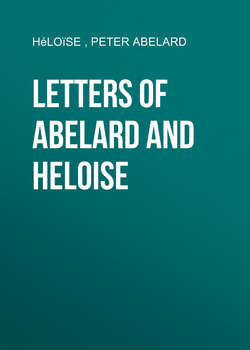Читать книгу Letters of Abelard and Heloise - Peter Abelard - Страница 1
PREFACE
ОглавлениеIt is very surprising that the Letters of Abelard and Heloise have not sooner appeared in English, since it is generally allowed, by all who have seen them in other languages, that they are written with the greatest passion of any in this kind which are extant. And it is certain that the Letters from a Nun to a Cavalier, which have so long been known and admired among us, are in all respects inferior to them. Whatever those were, these are known to be genuine Pieces occasioned by an amour which had very extraordinary consequences, and made a great noise at the time when it happened, being between two of the most distinguished Persons of that age.
These Letters, therefore, being truly written by the Persons themselves, whose names they bear, and who were both remarkable for their genius and learning, as well as by a most extravagant passion for each other, are every where full of sentiments of the heart, (which are not to be imitated in a feigned story,) and touches of Nature, much more moving than any which could flow from the Pen of a Writer of Novels, or enter into the imagination of any who had not felt the like emotions and distresses.
They were originally written in Latin, and are extant in a Collection of the Works of Abelard, printed at Paris in the year 1616. With what elegance and beauty of stile they were written in that language, will sufficiently appear to the learned Reader, even by those few citations which are set at the bottom of the page in some places of the following history. But the Book here mentioned consisting chiefly of school-divinity, and the learning of those times, and therefore being rarely to be met with but in public libraries, and in the hands of some learned men, the Letters of Abelard and Heloise are much more known by a Translation, or rather Paraphrase of them, in French, first published at the Hague in 1693, and which afterwards received several other more complete Editions. This Translation is much applauded, but who was the Author of it is not certainly known. Monsieur Bayle says he had been informed it was done by a woman; and, perhaps, he thought no one besides could have entered so thoroughly into the passion and tenderness of such writings, for which that sex seems to have a more natural disposition than the other. This may be judged of by the Letters themselves, among which those of Heloise are the most moving, and the Master seems in this particular to have been excelled by the Scholar.
In some of the later Editions in French, there has been prefixed to the Letters an Historical Account of Abelard and Heloise; this is chiefly extracted from the Preface of the Editor of Abelard's Works in Latin, and from the Critical Dictionary of Monsieur Bayle1, who has put together, under several articles, all the particulars he was able to collect concerning these two famous Persons; and though the first Letter of Abelard to Philintus, in which he relates his own story, may seem to have rendered this account in part unnecessary; yet the Reader will not be displeased to see the thread of the relation entire, and continued to the death of the Persons whose misfortunes had made their lives so very remarkable.
It is indeed impossible to be unmoved at the surprising and multiplied afflictions and persecutions which befel a man of Abelard's fine genius, when we see them so feelingly described by his own hand. Many of these were owing to the malice of such as were his enemies on the account of his superior learning and merit; yet the great calamities of his life took their rise from his unhappy indulgence of a criminal passion, and giving himself a loose to unwarrantable pleasures. After this he was perpetually involved in sorrow and distress, and in vain sought for ease and quiet in a monastic life. The Letters between him and his beloved Heloise were not written till long after their marriage and separation, and when each of them was dedicated to a life of religion. Accordingly we find in them surprising mixtures of devotion and tenderness, and remaining frailty, and a lively picture of human nature in its contrarieties of passion and reason, its infirmities, and its sufferings.
1
Vide Artic. Abelard, Heloise, Foulques, and Paraclete
